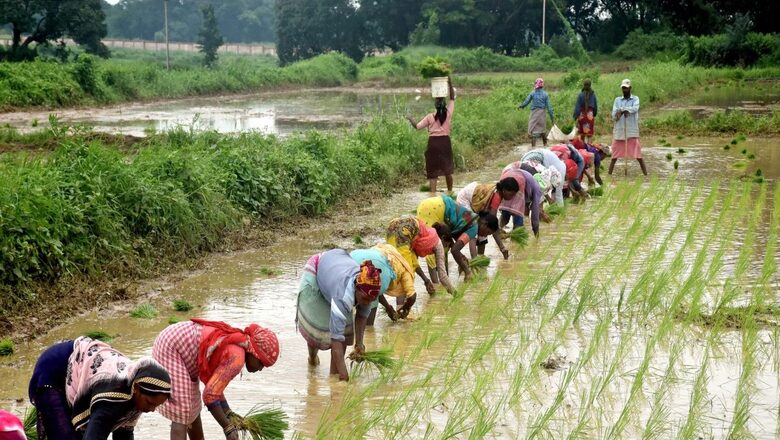
views
In a positive move towards revolutionising agriculture in the country, the Government of India has recently unveiled three significant initiatives. The launch of the Kisan Rin Portal, Ghar Ghar Kisan Credit Card Abhiyan and the Weather Information Network Data Systems (WINDS) stands as a testament to the government’s commitment to empowering farmers and bolstering their resilience. The National Farmer’s Day 2023 theme — Delivering Smart Solutions for Sustainable Food Security and Resilience — also stood in alignment with the government’s focus on farmers.
Facilitating financial inclusion and ensuring easy capital access for farmers is undeniably crucial, yet it is also important to equip farmers with resources to enhance agricultural productivity. Hence, initiatives like WINDS hold immense significance, employing data-driven methodologies to furnish farmers with indispensable insights, enabling them to optimise agricultural practices effectively.
While government initiatives focus on extensive coverage, there’s a pressing need to delve deeper and cultivate numerous localised success stories and mini-revolutions.
The corporate sector in India has notably spearheaded this effort through various impactful initiatives. ITC’s Climate Smart Agriculture (CSA) initiative is an apt example and can be a compelling complement to the government’s WINDS initiative. This synergy becomes particularly pertinent within the context of climate change, which poses a significant threat to farmers.
A recent survey by Bayer Group conducted across eight countries, including India, the US, Australia and China, revealed concerning statistics: 76 per cent of farmers express concerns about the future implications of climate change, with 71 per cent stating that it has already impacted their farms and incomes.
Initiatives like ITC’s Climate Smart Agriculture (CSA) program play a pivotal role in addressing such challenges. The CSA program aims to mitigate risks posed by unpredictable weather patterns by promoting practices aligned with climate-smart agriculture. This includes the introduction of heat-tolerant crop varieties and the implementation of customised crop cycle approaches. By focusing on such smart practices, such private sector interventions can empower farmers, minimising the adverse effects of climate change.
The true measure of the effectiveness of such programs lies in their tangible impacts on the ground. The ITC CSA program stands as a testament to this, having significantly benefitted 740,000 farmers, covering an expansive 23.4 lakh acres across 19 states in India. The initiative has led to a remarkable increase in the net returns of farmers by as much as 90 per cent. A comprehensive study conducted across 43 villages spanning three states has shown that an astounding 70 per cent of these villages have transitioned into the category of “High Resilience, High Yield,” marking their successful adaptation to climate-smart practices.
ITC’s engagement with farmers lies in its seamless integration with its business value chains. An example of this integration is evident in its FMCG business, where the sourcing of commodities is meticulously conducted through a robust network of Farmer Producer Organisations (FPOs). This strategic approach not only enhances supply chain efficiency for the business but also facilitates equitable and efficient price discovery mechanisms benefiting the farmers directly.
Similarly, within its Paper Business division, ITC has initiated a robust social and farm forestry program that mitigates risks faced by underprivileged rural households. It achieves this by diversifying its farm portfolios through the promotion of tree-based farming practices. By intertwining business operations with community-centric initiatives, ITC’s approach not only fortifies its commercial pursuits but also socio-economically uplifts the farmer.
Leveraging technology stands as a crucial pillar in empowering farmers, and ITC’s ITCMAARS (Metamarket for Advanced Agriculture and Rural Services) is a good example. It is a pioneering ‘phygital’ ecosystem focussed on empowering farmers. The model revolves around physical interactions with FPOs while offering a powerful digital super app. The ITCMAARS super app, downloadable on farmers’ phones, serves as a comprehensive resource hub, delivering personalised agricultural services through a plug-and-play framework. Presently, it supports 1,600 FPOs across 10 states, registering over 10 lakh farmers and fostering around 60 partnerships. With an ambitious vision, ITCMAARS aims to extend its impact, targeting 4,000 FPOs and reaching 10 million farmers across multiple crop clusters by 2030.
Government bodies like NITI Aayog are at the forefront of supporting farmers, while private entities like ITC have collaborated closely with NITI Aayog to bolster this support. Their collaboration, spanning from 2018 to 2022, aimed to enhance indicators in agriculture and allied services across 27 aspirational districts in eight states.
Such interventions underscore two crucial focal points that need to be stressed: firstly, a concentrated effort on elevating farmer incomes, and secondly, the implementation of large-scale programs that significantly impact farmers’ lives. Moreover, challenges posed by climate change should be addressed and interventions for farmers should align with the national objectives of ‘Make in India’ and ‘Doubling Farmers’ Income’. These efforts should resonate with the overarching theme of Atmanirbhar Bharat, emphasising the country’s strength and enhanced competitiveness.
Rajesh Mehta is a leading International expert on areas related to Market Entry, Innovation and Public Policy. Views expressed in the above piece are personal and solely that of the author. They do not necessarily reflect News18’s views.




















Comments
0 comment